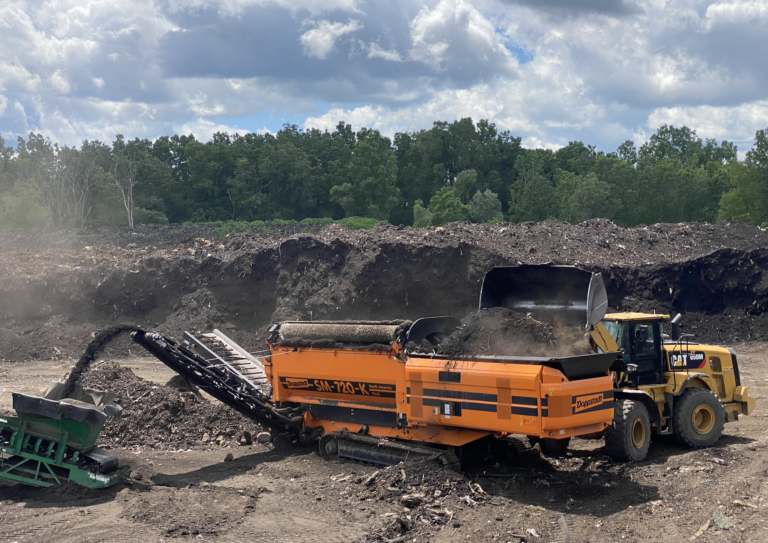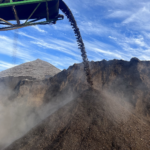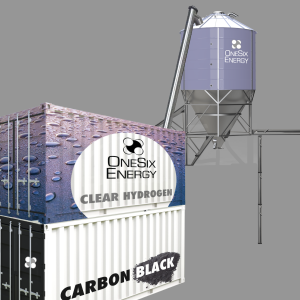
- Kim Kisner
- Business
- 04/15/2025
A Q&A With Spurt Industries About the Opportunities and Challenges

Spurt Industries is a Wixom-based composting facility and the only EGLE-registered site in Macomb, Wayne, and Oakland counties producing STA Certified Compost, which is the Seal of Testing Assurance from the U.S. Composting Council. The company focuses on transforming food waste into high-quality compost products, working with a wide range of partners to divert waste from landfills and support healthier soils across Southeast Michigan. Through these efforts they consistently divert 15 million pounds of food waste from landfills annually.
SBN Detroit interviewed Bill Whitley Jr., Owner and General Manager, and Adriana Whitley, Sales and Marketing Director, about the company’s origin, how compost is created and classified, and the importance of expanding food waste programs.
Q: What inspired the founding of Spurt Industries, and how has the company’s mission evolved since its inception?
A: Spurt Industries was founded in 1994, coinciding with Michigan’s yard waste ban, which required that yard waste be composted instead of landfilled. That legislation sparked the emergence of commercial composting operations in the state, including Spurt’s original facility in Grand Rapids.
In 2008, a previous owner had opened a site in Wixom. We acquired the business in 2016 and have been operating fully out of that location.
In Marc, we took over the SOCRRA Composting Yard in Rochester Hills, giving us two locations with roughly equal volume. This will allow us to process approximately 200,000 cubic yards of organics annually, making Spurt one of the largest composters in Michigan.

Q: What does it mean to be an EGLE-registered composting facility?
A: The previous process to become registered was as simple as submitting a one-page form and fee, but the state passed new solid waste laws about two years ago with new regulations. Now, the requirements are much more robust and we’re fully supportive of that shift.
To operate a commercial composting site, facilities must now obtain a general permit and develop detailed documentation, including operational, fire safety and training plans, and more.
We also post a $20,000 bond with the state. These measures ensure that composting is done responsibly and consistently across operators.
We were involved in lobbying for these changes because we want a level playing field where materials are managed safely and sustainably.
Q: What is the significance of being the only facility in Macomb, Wayne, and Oakland counties producing STA Certified Compost?
A: The STA Certification is administered by the U.S. Composting Council and is one of the most rigorous compost quality programs in the country. Only four facilities in Michigan currently hold this certification, and we’re proud to be one of them.
The certification process includes documenting all input materials, monitoring every compost pile weekly for temperature, moisture, and density, and conducting rigorous lab testing on finished compost. That includes testing for nutrients, metals, and pathogens, and running plant growth trials.
This high standard has enabled us to sell compost to certified organic farms – and most importantly, we produce a clean product, free of plastic, glass, or metal contamination. That’s core to our mission.

Q: What distinguishes different grades of compost, and how are they managed?
A: Several factors influence compost quality:
- Feedstock: The materials used to make the compost matter. Incorporating food waste alongside yard waste increases nutrient value and mimics natural decomposition processes.
- Contamination and Pathogen Control: Compost must be free of contaminants and turned regularly to kill pathogens. Otherwise, it won’t meet quality standards.
- Chemical Maturity: Compost must be fully matured. “Hot compost” that hasn’t cured properly won’t support plant growth.
- Screening Method: Screen the product to remove oversized or undecomposed material. The finer the screening, the more refined the compost.
Beyond quality, we’re also mission-driven to expand food waste composting. Yard waste is mandated by law, but food waste is not – and yet, Michigan sends 1.5 to 2 million tons of food waste to landfills annually. That’s a missed opportunity for soil and water quality improvement.
When we apply compost to soil, it increases water absorption by about 100 gallons per cubic yard. That means less runoff, less strain on sewer systems, and fewer sewage overflows into our lakes, which is critical for protecting Michigan’s economy and tourism industry.
Q: What has been the reaction from local businesses? Have you seen more interest in food waste recycling of late?
A: Absolutely. While COVID-19 significantly disrupted commercial food waste collection – dropping volume by over 90% – we’ve since seen a steady rebound. We now see meaningful enthusiasm from businesses and strong policy support from the state. Michigan has a goal to cut food waste in half by 2030, and EGLE is developing a statewide roadmap that includes composting as a key strategy.
Q: How does composting help mitigate climate change and support the environment?
A: There are two major benefits:
- Methane Reduction: Food waste in landfills produces methane – a potent greenhouse gas. Composting food waste in an aerobic (oxygen-rich) environment prevents this.
- Carbon Sequestration and Soil Health: Compost improves soil quality and reduces the need for synthetic fertilizers, which often require long-distance transport and carry environmental costs. Applying compost also helps sequester carbon in the soil.
It’s a win-win for climate and community.
Q: Are there untapped opportunities for food waste diversion and composting in Southeast Michigan?
A: Yes. There’s a long list. Only a few communities offer food scrap drop-off programs, and even fewer allow food and yard waste to be co-mingled.
Less than 1% of restaurants and schools are currently composting, and yet these sectors produce massive amounts of food waste. We believe every business should be composting.
We have found that when restaurants begin composting, they become more aware of their overall food waste and often change behavior, improving efficiency and reducing waste overall.
Grocers like Meijer and Walmart have made meaningful progress in composting, but there’s still significant untapped potential for other businesses and municipalities to follow suit.
Q: What are the biggest barriers to business adoption?
A: Cost is one. The other is what we call the “ick factor.” Businesses worry about smells or attracting pests. But in all our years doing this, we’ve never lost a customer due to smell or rodents.
Once people get past those concerns, they realize composting is not only practical, it’s powerful.
Q: What’s next for Spurt Industries?
A: We’re growing. We’ve expanded into Rochester Hills as I mentioned. We’ve invested in new equipment and added an air separator to remove plastics from incoming material. We’re scaling food waste intake and looking for new locations.
We also brought on a soil scientist to help manage our certifications and deepen our expertise. And we remain heavily involved in state-level advocacy to move the entire composting industry forward.
A rising tide lifts all ships – and we’re proud to help lead that charge.
Be sure to subscribe to our newsletter for regular updates on sustainable business practices in and around Detroit.
Kim Kisner
- All
- Business
- Community
- Education
- Events

Eastern Market Partnership, in collaboration with the City of Detroit’s Office of Sustainability Urban Agriculture Division, has announced $240,000 in grant funding to support Detroit-based farmers and farmer collectives. The grants will advance food access, climate education, sustainable land use, and economic opportunity, with priority given to Black- and Indigenous-led farms, youth-led initiatives, and projects rooted in historically disinvested neighborhoods. The recipients – ranging from cooperatives and community...

Citizen Robotics is a Detroit-based nonprofit that advances the use of robotics and digital manufacturing in residential construction, focusing on improving productivity, sustainability, and long-term affordability. Best known for its early work in 3D-printed housing, it explores how alternative construction methods and new financial models can reduce material waste, lower lifetime operating costs, and enhance the resilience of homes. SBN Detroit interviewed Tom Woodman, founder and president of...

Detroit-based OneSix Energy is a clean-energy technology company focused on advancing a lower-carbon approach to hydrogen production. Headquartered at Newlab in Detroit, the startup is developing a proprietary methane pyrolysis system designed to produce hydrogen without carbon dioxide emissions, while also generating solid carbon as a co-product. SBN Detroit interviewed with cofounder Stefan Sysko about the company’s origins, its approach to hydrogen production, and why Detroit is positioned...







